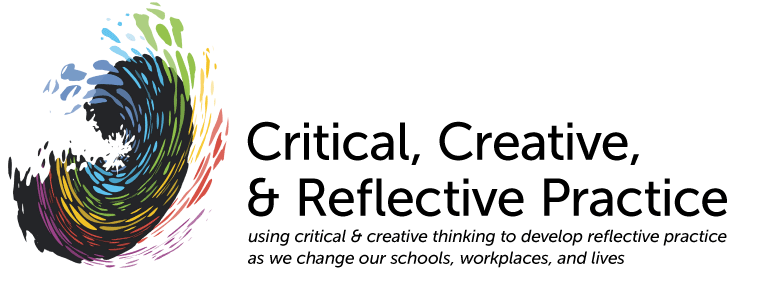This face2face session introduces the sequence and rationale for
Collaborative Explorations (CEs), which are designed for in depth online interaction and inquiry over a delimited period of time.
Peter Taylor, Director, Graduate Program in
Critical and Creative Thinking, and
Science in a Changing World track, University of Massachusetts, Boston,
peter.taylor@umb.edu
This page, with live links, can be viewed at
http://bit.ly/CE16May
Invitation
a. overview
- * CEs = an extension of Problem- or Project-Based Learning (PBL) and related approaches to education in which participants address a scenario or case in which the problems are not well defined, shaping their own directions of inquiry and developing their skills as investigators and prospective teachers (in the broadest sense of the word).
- * Typically: consists of 4 sessions, one week apart; same small group interacts in real time live via the internet for 60-90 minutes. Participants spend similar time between sessions on self-directed inquiry on the case, posting of inquiries-in-progress with their small group, and reflecting on the process (which typically involves shifts in participants' definition of what they want to find out and how).
b. case or scenario
- Today: "What valuable aspects of face2face interactions should be brought better into online courses, MOOCs, synchronous online meetings, and how?"
c. sign up
d. get set up
- on google+ with hangout plugins, headset etc. Join community for the CE.
Session 1; Autobiographical intros
- * each person takes 5-7 minutes to tell the story of how they came to be a person who would be interested to participate in a CE on the scenario.
- * gather and share our thoughts at the end (using a format like http://bit.ly/CIQ1e then posted to the google+ community).
Between-session work: Initial investigations & posts
Session 2: Five-phase format discussion, to clarify what we are thinking about the case
- Freewriting -> check-in -> turn-taking “dialogue process” -> gather and share our thoughts.
Between-session work: More inquiry and posting related to the case. Prepare a
work-in-progress (W-I-P) presentation
Session 3: Work-in-progress presentations
- * 7-10 minutes total for each participant
- * Plus-delta feedback is made by everyone on each presentation
- + (=something you appreciated)
- delta (= to be developed further)
Between-session work: more inquiry, revise W-I-P presentation into product (shareable to wider world?), post reflections
Session 4: Five-phase format discussion, to reflect on experience, outcomes, process, next steps
- + (=something you appreciated)
- delta (= to be developed further)
After session 4 (optional): Participants share products to the wider community
The use of the internet should be guided by two principles of online education
(http://bit.ly/YSzxAQ):
1. Use computers first and foremost to teach or learn things that are difficult to teach or learn with pedagogical approaches that are not based on computers
[e.g., bring in participants from a distance; make rapid connections with informants or discussants outside the course; contribute to evolving guides to materials and resources]
2. Model computer use on best practices for teaching-learning without computers
[e.g., In CEs students (or participants) become self-directed and collaborative learners—gaining tools, ideas, and support from instructors and peers (or other participants) who they can trust; integrating what they learn with their own personal, pedagogical, and professional development]
(High-profile MOOCs do not appear to be governed by these principles and are not conducive of deep or "thick" inquiry.
|
